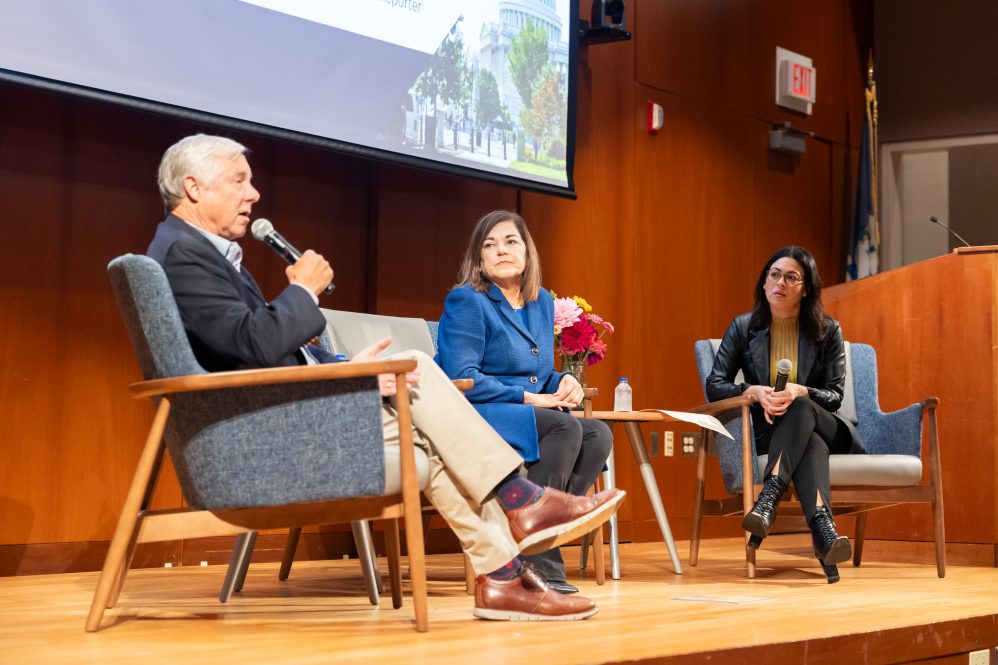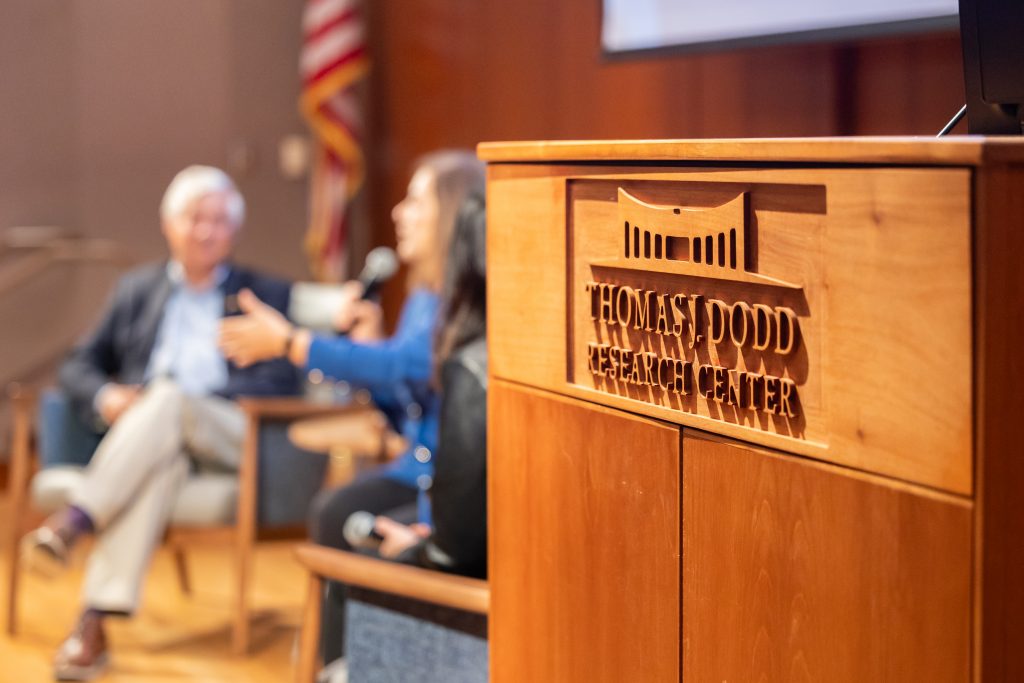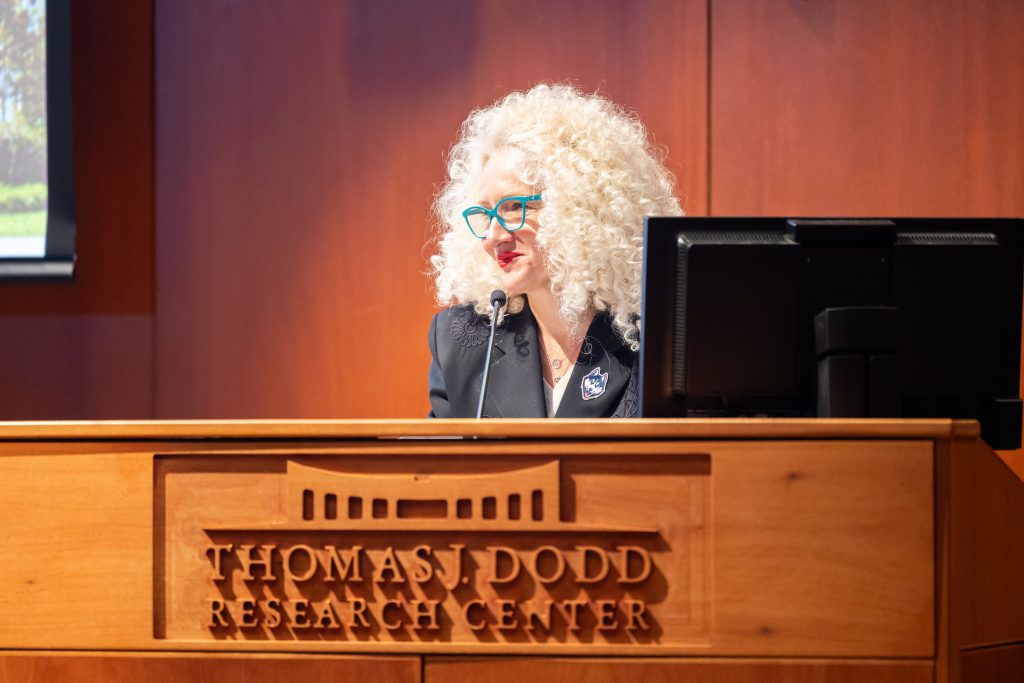'Today's conversation is important, because it is a reminder of what our discourse can be'

Former members of Congress Fred Upton and Loretta Sanchez participate in a discussion with NBC CT anchor and reporter Amber Diaz '11 (CLAS) during Congress to Campus at the Dodd Center on Sept. 26, 2024. (Sydney Herdle/UConn Photo)
By all appearances, the two former longtime members of the U.S. House of Representatives who visited UConn Storrs on Thursday morning could not have been more different.
The first, a Latino woman from Orange County, California.
The second, a white man from southeast Michigan.
The first, a Democrat who won her seat in Congress by defeating a long-serving Republican by less than 1,000 votes in 1997.
The second, a Republican from a swing district who worked as a congressional staffer and a member of Ronald Reagan's administration before his own election in 1987.
But on the stage of the Konover Auditorium at The Dodd Center for Human Rights - before a crowd of mostly UConn students - it wasn't the differences between former Rep. Loretta Sanchez (D-CA, 1997-2017) and Rep. Fred Upton (R-MI, 1987-2023) that were on display.
It was, instead, the similarities that they share after two long careers in public service.
In a comfortable conversation moderated by NBC Connecticut reporter and anchor Amber Diaz '11 (CLAS) and punctuated by anecdotes from their own personal lives and experiences, Sanchez and Upton talked about the challenges in bridging divides at a time when politics feel increasingly polarized, and misinformation is rampant.
"Sadly, today, it's different from when I was in the Congress even a year ago," said Upton.
Both Sanchez and Upton stressed the importance of listening to other viewpoints, of being an educated voter, and electing leaders - regardless of political affiliation - who believe in and uphold democratic institutions.
"People come and go, personalities come and go, but institutions are the mainstay of what makes us a good society," said Sanchez.

They also discussed what it means to "meet people where they are" - something that feels even more relevant at a time of political division.
"When people come to the Congress, when people come to positions of power at the city or state level, they come with their own baggage," Sanchez said. "They come with their own history, what their experiences are. Everybody has a story. Everybody can be an interesting person. You just have to take the time to listen to who they are, and if you take that time, then I believe you can find common ground."
"Finding out about other people's districts, what they cared about - whether it's energy policy or health policy, whether you could help them, whether they be a Republican or Democrat, being able to go to the other side of the aisle and being able to have a conversation with them, talk about amendments - that's, to me, how you meet people where they're at," said Upton. "And that's how things ought to get done."
Sanchez and Upton visited UConn through Congress to Campus - the flagship program of the nonprofit organization FMC, a bipartisan, voluntary alliance of former U.S. Senators and Representatives who advocate for representative democracy at home and abroad.
Congress to Campus offers a unique civic educational experience by engaging honest dialogue with bipartisan teams of former members of Congress, congressional staff, and American diplomats. Sessions have been held on 183 campuses in 43 states and seven countries, reaching more than 57,000 students in the last 10 years alone.
"Today's conversation is important, because it is a reminder of what our discourse can be," said Nick Lanza, '25 (CLAS), the director of external affairs for UConn's Undergraduate Student Government. "That we can have civil discussions. That we can debate different opinions, without getting personal. Today is about a better way forward."
The need for civic participation is crucial every year, UConn's President Radenka Maric said in her welcoming remarks before the discussion. But this year, in the midst of a presidential election, participation feels especially urgent.
"We live in a time when Americans seem divided in an almost unprecedented way," she said. "Across social media and the traditional news media, there is no shortage of angry, aggrieved voices denouncing there fellow Americans on the other side of the ideological divide.
"And yet, as the Carnegie Endowment for International Peace recently found, in reality, there is more common ground among Americans on policy issues than many people believe," Maric continued.
James Waller - the inaugural Christopher J. Dodd Chair in Human Rights Practice at UConn and director of Dodd Human Rights Impact Programs, which hosted the Congress to Campus event - said it's true that democracy is on the ballot in the U.S. this year.
"But, in truth, democracy is always on the ballot," Waller said. "Every federal election, every state election, every local election, every election at every level asks us the collective question of who we aspire to be.
"True democracy is never absolutely sure of itself. In other words, true democracy is always interrogating itself. It's always asking itself hard questions," Waller said. "Indeed, the biggest threat to democracy is when it becomes so sure of itself that it stops asking those hard questions, when we take it so much for granted that we stop actively nurturing and sustaining our democratic institutions, when we take it so much for granted that we choose not to exercise our right to vote, that we choose not to civically engaged because we feel so powerless and things feel so distant from us."
But Upton and Sanchez also had an overarching message for the students in attendance: Your action is needed.
"We're really here to tell the young people in the room run for office, work on campaigns, get involved locally," Sanchez said. "We need you. We need you to decide that public service is really worth it and bring your ideas. Bring your new energy. Help us to solve the issues that are affecting your lives every day."

"You're our future, and you've got to be part of it," said Upton. "Because if we're going to turn this ship around, it starts with you."
That call to action is also what Diaz, who studied journalism and English as an undergrad at UConn, hopes that students will take away from the event.
"I really hope that they took away the power of a vote and that they will get involved, because it's very, very imperative that they get involved," Diaz said. "And I hope they get involved in politics, because honestly, nowadays, people turn off the TV. Or they turn off the radio. They don't want to hear it. Or it's the other extreme, and they want to argue about it.






